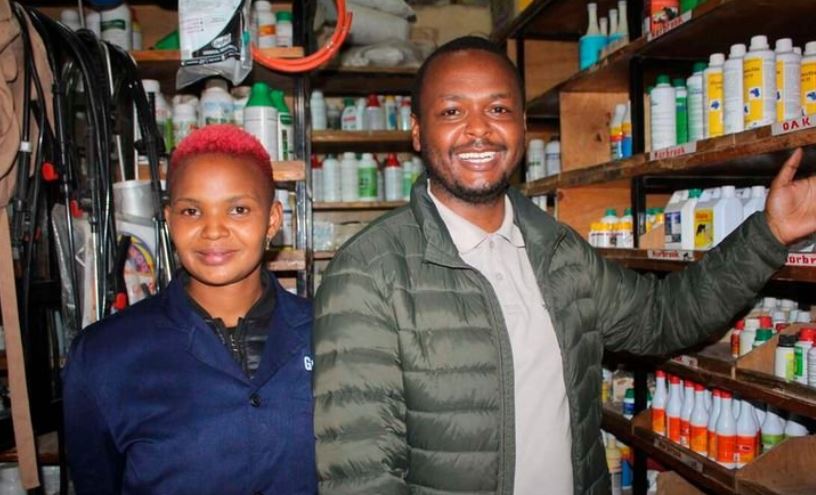
The 40-year-old started the store in 2008 and spoke to ‘Seeds of Gold‘ on what it takes to start the business and run it successfully.
Why did you get into this line of business?
I saw a gap and decided to fill it. I was working with a multinational dealing with the supply of farm inputs and noticed that few professionals were running agrovets. My research indicated that many of them were animal health specialists, yet they were selling crop products. Again, some of those running the shops were neither crop nor livestock specialists. I chose to make a difference.
You hold a master’s degree in crop protection and your wife is a food and nutrition specialist, generally, what minimum qualification does one need to run the business?
Having professional qualifications is advantageous, but anyone with as little as a certificate in agriculture can run a small to medium agro-business.
How much did you start with?
I started small, with Sh60,000 capital which I used to pay rent and buy my initial stock. I would then do consultations with the farmers and visit their farms. My business model was to offer both products and expertise.
You see, business is not all about having money. I isolated the assets I had: knowledge, experience in the field, and a ready market. I had a good reception from the word go; on my first day I served two clients and by week one, 40 farmers had visited my shop.
Soon after, we were overwhelmed with orders yet we lacked finances to get the farm inputs. Luckily, from my previous job, I had worked with several distributors, which helped me get goods on credit, sell and pay. After two years, I took a Sh1.2 million bank loan to expand the business.
What makes this business popular?
There is a huge demand for agricultural farm inputs as many take up farming. Again, starting is not hard. In our case, we serve over 1,000 farmers on average during the peak season as it is currently, but this halves during the low season. About 70 percent of our clients are smallholder farmers and they are served by our 46 workers. The farmers come from Uasin Gishu, Elgeyo-Marakwet, Trans-Nzoia, Busia, Nandi Kakamega, and Bungoma counties.
What licenses does one need to start this business and how much do they cost?
They include Pest Control Products Board (PCPB) license Sh1000 for a small business, Kenya Plant Health Inspectorate Service (Kephis) license for small business Sh1,000, and county license Sh10,000. Other licenses and documents that one can acquire as they progress are Agrochemicals Association certification, fire license, and insurance.
Agrovets are the first point of call for farmers in distress, have the shops filled the space once occupied by agronomists?
In a way, yes, and the agro vet operator has no choice but to play the role; the reason why one must employ professionals. Due to the gap, farmers have forced us to offer agronomy services but the good thing is that you also sell your products. When we started a free agronomy service, where we send agronomists on motorbikes for farms, it looked costly but soon our sales improved. This helps one to maintain a loyal customer base.
One of the major problems facing the sector is an influx of fake products, how does one guard against this?
You have to be familiar with the regulations laid down by Kephis for the seeds and PCPB for agro-chemicals. These bodies also conduct regular inspections for compliance.
Second, if you can, source quality inputs directly from manufacturers, not from other agrovets.
Third, evaluate every complaint that comes from farmers. This will help you pick out fake products and address them accordingly. For instance, seeds may fail to germinate, but this may be due to delayed rains and not necessarily fake products.
What lesson have you learnt about the business?
When stocking, be guided by farming seasons. Sometimes rains delay but the experience is that farmers always plant by March, so in our case, we stock by February. Also, invest in technology to run the shop, which will help you analyse trends in the market. In my case, I can access data about the business from 10 years ago. There is great competition in the business, but focus on what you do to stand out.
Lastly, there is always the temptation of expanding the business by opening various branches. This must be done in a calculated manner. Between 2012 and 2014, I opened six outlets in various counties but I was forced to close them in 2015 after they were run down. I went into losses and was forced to take loans to offset debts. We chose to concentrate on our main shop in Eldoret, though we are now working on expansion once again. We want to have presence in Kirinyaga, Nyeri, and several other places.
Expert Talk
Carol Mutua, a crops specialist from Egerton University, notes that many people have turned to agrovets because of a huge demand for inputs as hundreds embrace farming.
The law requires that agrovets should be run by qualified and trained personnel. ‘‘The agrovet owner and employees should be trained in plant and animal health. In addition, the employees should also be qualified and registered with Kenya Veterinary Board in case they are animal specialists,” she says.
However, according to her, tens of agrovets across the country are operated by people or employees who are neither qualified nor trained and yet they sell agrochemicals to farmers. ‘‘Trained employees can understand what the customer requires thus avoid the risk of selling the wrong product to customers.”
They will also ensure proper storage of products like fertilisers away from moist places and drugs or chemicals which should not be exposed to light.
source http://nairobiwire.com/2021/05/my-hustle-i-started-agrovet-business-with-sh60000-capital.html
No comments:
Post a Comment